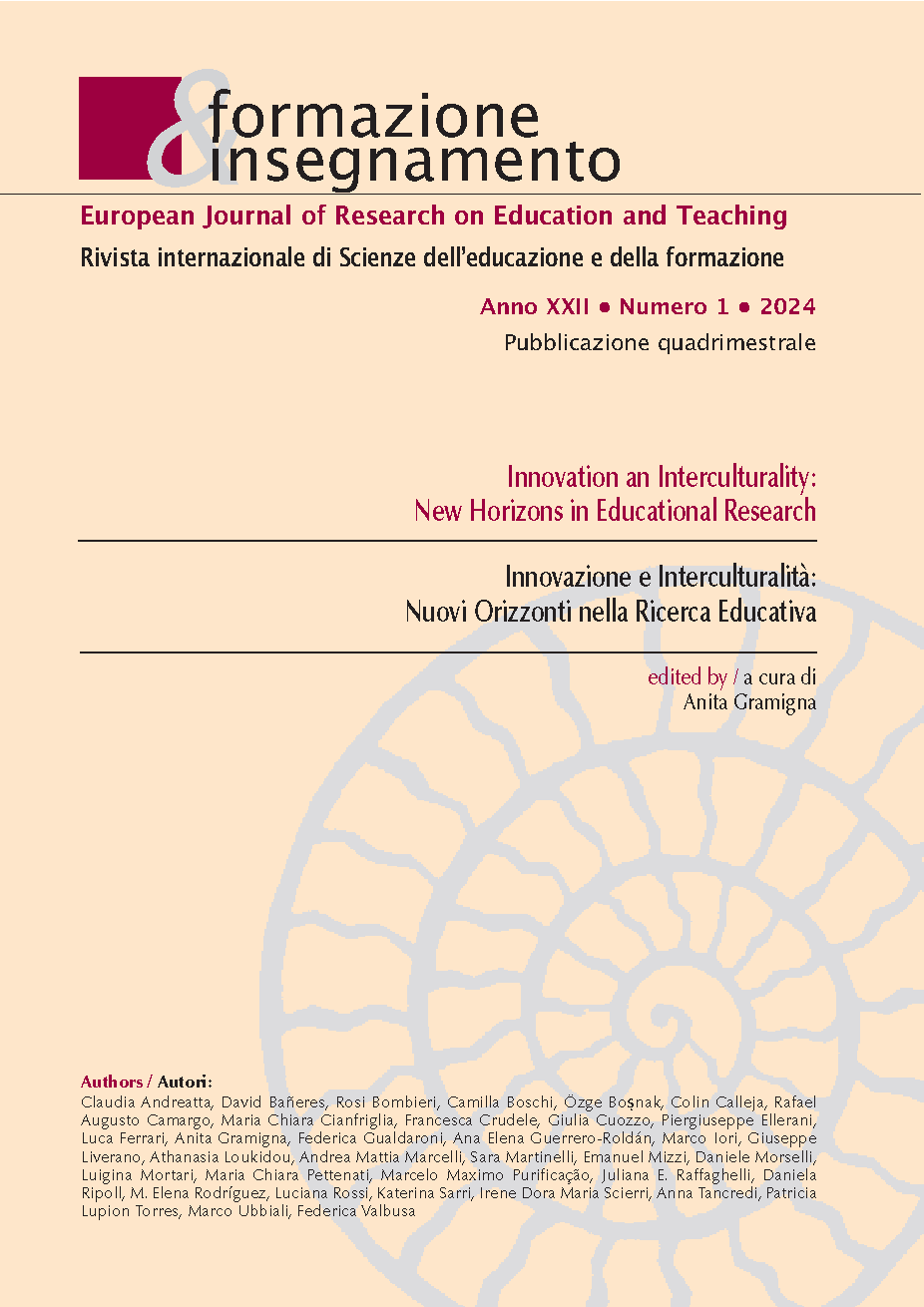El aporte de los ecosistemas de IA generativa en la micro-diseño instruccional: Oportunidades y limitaciones
DOI:
https://doi.org/10.7346/-fei-XXII-01-24_13Palabras clave:
Inteligencia Artificial, Planificador Pedagógico, Profesionalidad docente, Diseño instruccionalResumen
Los Planificadores Pedagógicos [Pedagogical Planners] (PP) son entornos digitales desarrollados ad hoc con el objetivo de asistir a los docentes en hacer visible (y metodológicamente fundamentado) el proceso de ideación e implementación de experiencias de enseñanza-aprendizaje. La adopción de tales entornos en el contexto educativo inicialmente fue limitada por la falta de aplicaciones específicas, la baja difusión de estos sistemas en las escuelas y algunas limitaciones relacionadas con la 'estaticidad' de las propuestas didácticas generadas por estas herramientas. Sin embargo, en tiempos más recientes, la integración de algoritmos de Inteligencia Artificial generativa dentro de los PP, como los Planificadores de Lecciones AI [AI Lesson Planner], abre nuevas desafíos educativos y perspectivas inéditas de investigación educativa. Esto también plantea interrogantes sobre el verdadero papel del docente dentro de ello.
Citas
Antonenko, P., Abramowitz, B. (2023). In-service teachers’ (mis)conceptions of artificial intelligence in K-12 science education, Journal of Research on Technology in Education, (55)1, 64-78, https://doi.org/10.1080/15391523.2022.2119450
Baldacci, M. (2012). Trattato di pedagogia. Roma: Carocci.
Bertin, G. M. (1968). Educazione alla ragione. Roma: Armando Editore.
Bertolini, P. (1983). Pedagogia e scienze umane. Bologna: CLUEB.
Bottino M. R, Ott, M. Tavella M. (2011). Pedagogical planning and sustainability of learning actions: the Iamel system. Tecnologie Didattiche, 19(3), 147-154, https://doi.org/10.17471/2499-4324/207
Cameron, L., & Campbell, C. (2010). Sharing learning designs that work. Proceedings of World Conference on Educational Multimedia, Hypermedia and Telecommunications. Chesapeake, VA: AACE.
Conole, G., & Fill, K. (2005). A learning design toolkit to create pedagogically effective learning activities. Journal of Interactive. Media in Education, 8(1) https://doi.org/10.5334/2005-8
Costa, N. Pereira Junior, C., Araujo, R., Fernandes, M. (2019). Application of AI Planning in the Context of e-Learning, IEEE Computer Society, 57-59, https://doi.org/10.1109/ICALT.2019.00021
Dalziel J. (2003). Implementing learning design: the learning activity management system (LAMS). In G. Crisp, D. Thiele, I. Scholten, S. Barker, J. Baron (eds.). Proceedings of the 20th Annual Conference of the Australasia Society for Computers in Learning in Tertiary Education (AS-CILITE). Interact, Integrate, Impact (Adelaide, Australia, 7-10 december 2003). ASCILITE, 593-596.
Dillenbourg, P. (2002). Over-scripting CSCL: The risks of blending collaborative learning with instructional design. In P. A. Kirschner (Ed.). Three worlds of CSCL: Can we support CSCL (pp. 61–91). Heerlen, The Netherlands: Open Universiteit Nederland.
Dong, Y. (2023). Revolutionizing Academic English Writing through AI-Powered Pedagogy: Practical Exploration of Teaching Process and Assessment. Journal of Higher Education Research, 4(2), pp.52-57. https://doi.org/10.59400/fls.v6i2.1177
Fabbri, M. (2018). Oltre il disagio. Percorsi di crisi, orizzonti di civiltà. Milano: Franco Angeli.
Ferrari, L (2015). Costruire esperienze didattiche di online collaborative learning. Parma: Junior.
Kehoe, F. (2023). Leveraging Generative AI Tools for Enhanced Lesson Planning in Initial Teacher Education at Post Primary. Irish Journal of Technology Enhanced Learning, 7(2), 172-182, https://doi.org/10.22554/ijtel.v7i2.124
Laurillard, D. (2014), Insegnamento come progettazione. Milano: FrancoAngeli.
Margiotta, U. (a cura di) (2018). Teacher Education Agenda. Linee guida per la formazione iniziale dei docenti della scuola secondaria. Trento: Erickson.
Masterman, E., Manton, M. (2011). Teachers’ perspectives on digital tools for pedagogic planning and design. Technology, Pedagogy and Education, 20(2), 227-246. https://doi.org/10.1080/1475939X.2011.588414
Masterman, E., Walker, S., & Bower, M. (2013). Computational support for teachers’ design thinking: Its feasibility and acceptability to practitioners and institutions. Educational Media International, 50, 12-23. https://www.learntechlib.org/p/132440/
Miller, A. L. (2023). AI Assisted Learning: A Tool or a Threat? Journal of e-learning Research, 2(2), 52-65, https://doi.org/10.33422/jelr.v2i2.510
Mor Y., Warburton S., Winters N., Mellar H. (eds.) (2014). Practical design patterns for teaching and learning with technology. Rotterdam: Sense.
Nerantzi, C., Abegglen, S., Karatsiori, M., Martinez-Arboleda, A. (2023). 101 Creative ideas to use AI in education. A collection curated by #creativeHE.
OECD (2010). Inspired by Technology, Driven by Pedagogy. A Systemic Approach To Technology-Based School Innovations. Paris: OECD Publishing.
Persico, D. & Pozzi, F. (2013). Sustaining Learning Design and Pedagogical Planning in CSCL. Research in Learning Technology, 21, https://doi.org/10.3402/rlt.v21i0.17585
Pozzi, F., Asensio-Perez, J. I., Ceregini, A., Dagnino, F. M., Dimitriadis, Y., & Earp, J. (2020). Supporting and representing Learning Design with digital tools: in between guidance and flexibility. Technology, Pedagogy and Education, 29(1), 109-128, https://doi.org/10.1080/1475939X.2020.1714708
Rossi, P.G. (2014), Le tecnologie digitali per la progettazione didattica. Journal of Educational, Cultural and Psychological Studies (ECPS Journal), [S.l.], 10, 113-133, https://doi.org/10.7358/ecps-2014-010-ross
Rossi, P.G. (2016). Progettazione didattica e professionalità docente. PROPIT: l’artefatto progettuale come mediatore didattico. In P.G. Rossi, C. Giaconi (a cura di). Micro-progettazione: pratiche didattiche a confronto PROPIT, EAS, Flipped Classroom. Milano: Franco Angeli.
Rivoltella P. C. (2012). Neurodidattica. Insegnare al cervello che apprende. Milano: Raffaello Cortina.
San Diego, J. P., Laurillard, D., Boyle, T., Bradley, C., Ljubojevic, D., Neumann, T., Pearce, D. (2008). Towards a user-oriented analytical approach to learning design. ALT-J, 16(1), 15-29. http://dx.doi.org/10.1080/09687760701850174
Winograd, T. (1996). Bringing design to software. New York, NY: ACM Press.
Yue, M., Jong, M.S., Dai, Y. (2022). Pedagogical Design of K-12 Artificial Intelligence Education: A Systematic Review. Sustainability 14, 15620. https://doi.org/10.3390/su142315620
Descargas
Publicado
Cómo citar
Número
Sección
Categorías
Licencia
Derechos de autor 2024 Piergiuseppe Ellerani, Luca Ferrari

Esta obra está bajo una licencia internacional Creative Commons Atribución 4.0.
Formazione & insegnamento se distribuye bajo la licencia Atribución 4.0 Internacional (CC BY 4.0).
Para más detalles, por favor refiérase a nuestra Política de Repositorio y Archivo, así como a nuestros Términos de Derechos de Autor y Licencia.





